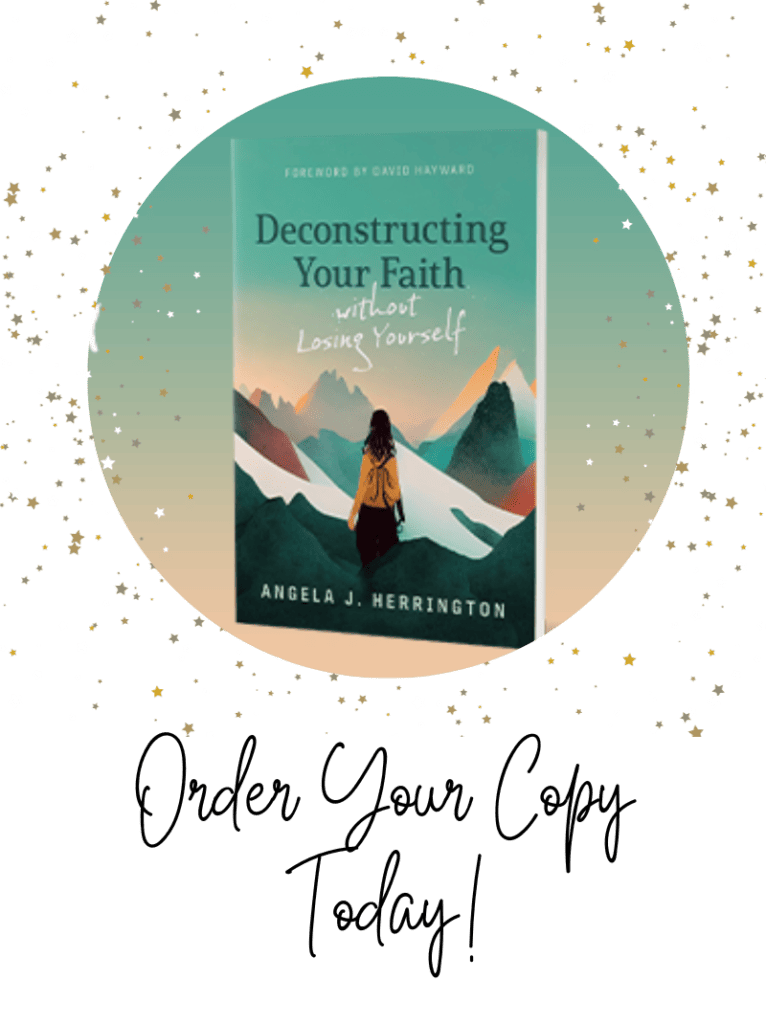I can already imagine people getting their hackles up about how spending less time in your church will be catastrophic and wreck your faith.
They’ll insist that deconstructing faith, especially if you step back from church, is going to lead you down that slippery slope to eternal damnation.
But if you, like me, have been hurt by the toxic doctrines, abuse, and just plain old meanness that runs rampant in many churches, walking away from the church to find God probably makes total sense to you. Deconstructing faith is hard enough on its own, but when you’re constantly surrounded by legalism and toxic beliefs, it can be overwhelming.
Why does it feel like sometimes you have to leave the church to find God?
Because when we are deeply connected to a church that proclaims they’re deeply connected to God, it’s really hard to determine who is driving that pain.
Is it God trying to shape us and mold us into Their image? Or is it people trying to maintain order within the toxic system that gives them more power?
Before we get any further, let’s just get really honest-deconstructing faith isn’t typically comfortable.
Sometimes spiritual growth really challenges us and there’s a lot of work to be done. It’s unrealistic to expect that the everyday Christian community will be all shiny happy people.
This conversation focuses on much deeper pain than the normal ups and downs.
Sometimes you have to leave the church to find God when what is being preached and taught pushes you towards legalism, racism, and hate.
Or when it promotes honoring the church and its leaders more than it invites you into a relationship with your Creator. Like when you are taught that we live under grace, but shame and exclusion are the primary motivation tools of your faith community.(Oh hello evangelicals, is that you?)
The bottom line is that stepping back from the system you rely so heavily on to help you connect with God will allow you to facilitate your direct connection with God.
There is, of course, a risk of completely walking away from God because it’s easier than rescuing your faith from all the toxic stuff. But if youre faith is 100% made up of toxic stuff, deconstructing faith may lead you to spiritually flouris for the first time EVER.
There’s certainly a risk of losing faith when you leave the church, but it’s not the guaranteed outcome that church leaders make it out to be.
We need to acknowledge that staying in toxic religious environments creates as much of a risk of leaving as deconstructing faith does.
How many people do you know who show up every Sunday out of duty or ego but have completely given up on having a personal connection with our Creator? Both situations are risky, so here are a few tips that will help you find balance when your heart is longing for God at the same time something inside is screaming “WALK AWAY.”
Here are a few tips to help you navigate faith deconstruction while deciding if you need to leave the church to find God:
Get some space, but don’t isolate yourself
COVID made this a little easier because most of us have had fewer face-to-face church gatherings than ever before. But it has also made it easier to silently fade into the background and be totally disconnected from the good parts of your faith community. So pick and choose wisely what you want to give your energy to. This might even mean getting distance from certain relationships.Do you have a wise friend who always listens, even when you ask really messy questions? Stay connected.
Do you have a friend who always listens but is so deeply embedded in the system that is hurting you that every piece of advice wounds you more? Take a break.
At the same time, don’t cut yourself off from human contact.
Make a point of connecting with the people who are steady and consistent in your life. If you are part of other communities, lean on those for a time. Embrace family members who are loving, supportive, and committed to seeing you flourish.
Use that empty space to rest first
As tempting as it may be, don’t immediately fill up the time you would spend in your faith community or related friendships with other activities.Pause.Give your body, brain, heart, and soul time to breathe. It’s natural to want to avoid or numb pain, and busyness is a really popular (and sneaky) way to do just that. However, healing comes from leaning into the pain and seeing what needs lie at the root of it.
So give yourself permission to rest, feel, and begin to heal after you leave the church.
After resting, then wrestle.
Everything isn’t going to make sense on the first day, but that’s OK. You’ve got time to wrestle with the nuances and grey areas of your faith.You may also realize, for the first time, that you have both space and permission to feel all the feels….
So go ahead and explore what’s coming up for you, and just trust that you’ll figure it out in your own time
No matter what, keep going, because you deserve to be free from toxic religion and to find healing from the harm that’s been done to you. Remember, it’s okay, and sometimes you have to leave the church to find God.
Remember, it’s okay to grieve the loss of what you once thought was your spiritual home. Leaving the church can feel like saying goodbye to a significant part of your life, and it’s okay to mourn that loss. Give yourself permission to feel sadness, anger, confusion, or whatever emotions may come up.
Just like any other form of loss, it’s a process that takes time.
And as you navigate this journey, hold onto the truth that your worth and spirituality aren’t defined by your association with a particular congregation or religious institution. Your connection with the divine is deeply personal and doesn’t depend on the approval of others.
Trust yourself and learn to lean into your intuition as you seek out what feels right for you on your spiritual path.
So, if you find yourself at a crossroads, torn between leaving the church and staying, know there’s no one-size-fits-all answer. The bottom line is that this is YOUR spiritual journey. No one else gets to decide what will best nurture your soul and allow you to grow in your relationship with the divine.
And maybe most importantly, remember that you’re not alone on this journey—there are others who have walked this path before you and are ready to offer support and understanding along the way.
How To Do That While Trying To Decide If You Should Leave The Church
Here are a few more practical tips to help you lean into your intuition during faith deconstruction:
- Explore Different Spiritual Practices: Take this opportunity to explore various spiritual practices outside of traditional church settings. Meditation, journaling, nature walks, or volunteering can all be avenues for connecting with your spirituality in new ways.
- Seek Out Alternative Communities: Look for alternative communities or gatherings where you can engage in meaningful conversations about faith and spirituality without the constraints of traditional religious structures. This could be a book club, discussion group, or online community focused on spiritual growth and exploration.
- Set Boundaries: Establishing boundaries is crucial for your emotional and mental well-being, especially if you’re distancing yourself from toxic religious environments. Learn to recognize and assert your boundaries regarding interactions with individuals or communities that may trigger negative feelings or beliefs.
- Practice Self-Compassion: Be gentle with yourself during this process of faith deconstruction and exploration. Feeling uncertain or conflicted as you navigate new beliefs and practices is normal. Practice self-compassion by offering yourself kindness, understanding, and forgiveness as you journey toward spiritual healing and growth.
- Educate Yourself: Take the time to educate yourself about different religious traditions, spiritual philosophies, and perspectives on faith. Reading books, listening to podcasts, or attending lectures by theologians, spiritual leaders, or experts in religious studies can broaden your understanding and help you discern what resonates with your own beliefs and values.
- Cultivate Gratitude: Practice gratitude to help shift your focus towards the positive aspects of your spiritual journey. Take time each day to reflect on what you’re grateful for, whether it’s moments of peace, supportive relationships, or insights gained through self-reflection. You don’t have to pretend to be thankful for everything(that’s spiritual bypassing. Instead, just find one or two things you’re actually thankful for and think about them regularly.
I know I say this A LOT, but remember, there’s no right or wrong way to navigate your spiritual journey, and it’s okay to embrace uncertainty and exploration along the way.
If you’re looking for a trauma-informed space to explore faith, ask questions, and be surrounded by others who are in similar seasons of faith deconstruction, I’d love to support you in The Faith Deconstruction Cafe…
Whether you’re just beginning to ask if you should leave the church or desperately fighting to preserve your faith, you’re welcome to pull up a seat in the group. You can get more information on this free Facebook community here.




Angela is a Faith Deconstruction Coach and host of The Deconstructing Faith Summit who helps people break free from toxic religious culture & empowers them to recover from #churchhurt. She has led online ministries for a decade, enjoys working with clients 1:1, in groups, and is a dynamic conference speaker. She’s a Lark’s Song Certified Life Coach who reaches thousands of people in 40+ countries each month on Facebook, IG, Twitter, Pinterest, and her blog.
She’s a firstborn, Enneagram 8, Gen Xer who loves to question everything. She holds a BA from Indiana Wesleyan and a Masters in Leadership from Wesley Seminary. Her graduate research project focused on leadership development and opportunities for Gen X women in the US church.
Angela and her unique online ministry are featured in Lyz Lenz’s 2019 book God Land: Story of Faith, Loss, and Renewal in Middle America. She has published articles in Hope for Women and HOPE is Now magazines. She has been featured in The New Republic, Publisher’s Today, and Religion News Service.
Her first book, Deconstructing Your Faith Without Losing Yourself, Will be published by Eerdmans in February 2023.
Angela is also a wife, mom to 5, and a proud resident of Marion, Indiana with her family when they’re not traveling the US in their RV.





